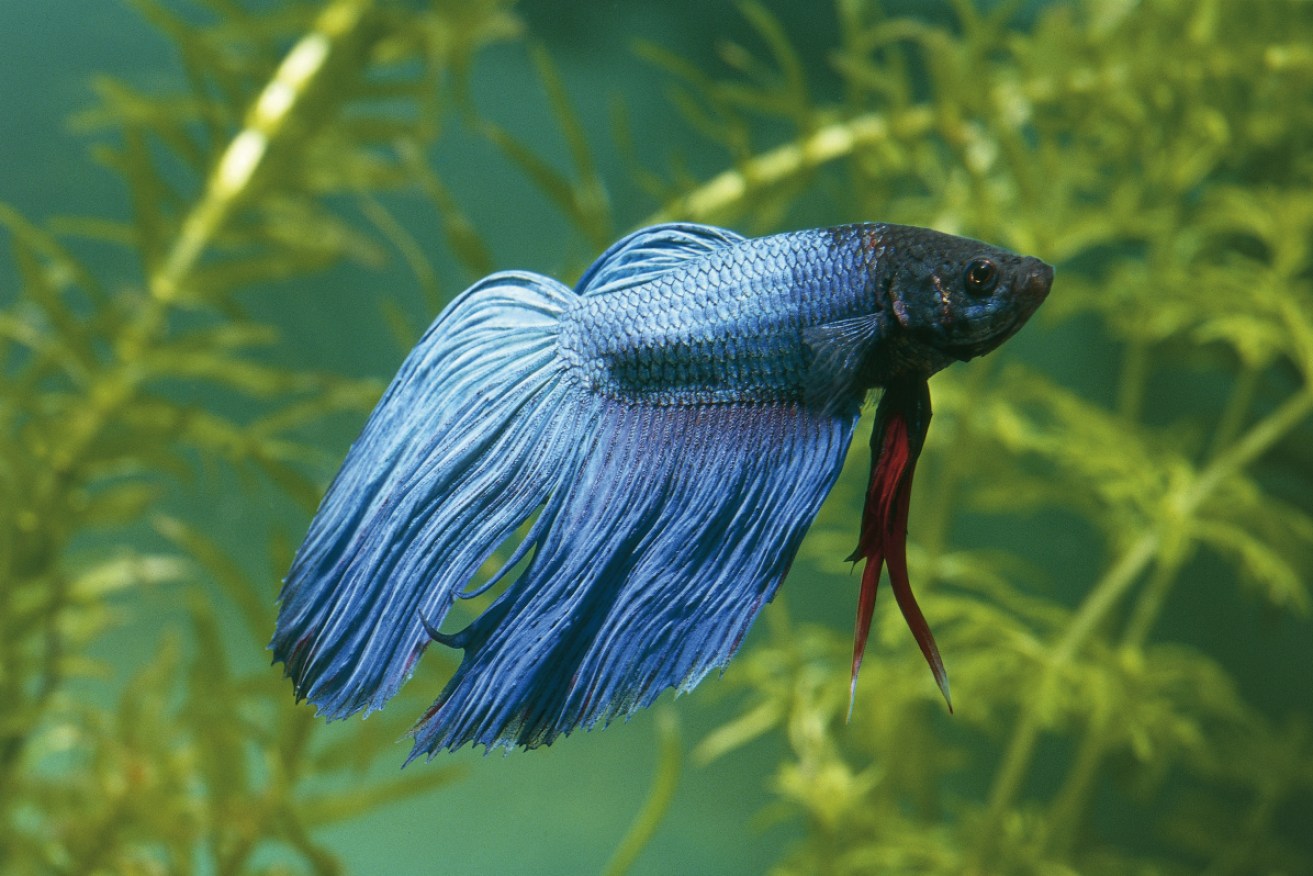Rogue Siamese fighting fish breeding by the thousands in Darwin’s Adelaide River

Once beloved tank-dwelling pets, fighting fish have been dumped and left to fend for themselves in croc-infested waters. Photo: Getty
Crocodiles might not be the only predator to worry about when you take the tinny out in the Top End.
The brightly coloured Siamese fighting fish, or betta, has gone rogue in Darwin’s Adelaide River.
Breeding by the thousands, the fish have reverted back to their most natural territorial form, losing their bright ornamental fins and instead flaunting brown camouflage scales.
“We are not sure how far they have bred at this stage, nor their impacts on our ecosystem,” said Dr Michael Hammer, Curator of Fishes at the Museum and Art Gallery of the Northern Territory.
“But due to their breeding we can only assume they are a pretty tough fish.
“It’s almost a form of reverse natural selection – they can’t survive with long ornamental fins as they are vulnerable to predators, so it’s the short-finned fish that are thriving in the wild.”
Dr Hammer said he first heard about the pest fish nearly three years ago, when a local ranger sent him a specimen to be identified in a beer bottle.
Due to their vast breeding grounds and high numbers, researchers are concerned eradication may no longer be an option.

Dr Michael Hammer said citizen scientists lead researchers to new marine discoveries, including the wild Siamese fighters. Photo: ABC
Heavy rain unleashed flood of fish
Dr Hammer ventured to the banks of the Adelaide River in search of the fish after floodwaters had overflown into a car park.
“At the boat ramp, in ankle-deep water, I had to kick these fish out of the way,” he said.
“What this suggested to me was that they had been breeding in small stagnant, concentrated shallows.
“So when the park flooded they spread by the thousands.”

Dr Hammer said the colourful fish would be easy prey in the wild, so the fighting fish have reverted to a simpler, more camouflaged appearance. Photo: Supplied
Originating from Thailand, the fish were once bred for fighting, but after being kept as pets for many years they have become more or less tame.
But Dr Hammer said once that they are released in the wild their survival instincts kick in and it is a different story.
“People assume because they are fancy looking fish they must be weak fish, but they have specialist skills like a labyrinth lung allowing them to breathe oxygen in shallow water,” he said.
“In the wild they can be a very territorial, aggressive, tough fish … we just need more opportunities to research them on the ground.”
Eradicating feral fish
Evan Needham, a passionate fighting fish breeder and the Manager for Marine Biosecurity at the NT Department of Fisheries, said since these first sightings the Top End has experienced “disappointing” wet seasons, limiting the research and monitoring of the feral fish.
“Because of where they are and the limitations of crocodiles and getting to the areas where these animals are likely residing during the dry season, it makes it very difficult to get in and control them,” Mr Needham said.
“As a result, we haven’t seen them for the last two years.
“Without constant monitoring there could be a significant impact from these species.”

The tough and territorial wild fighting fish can survive in small stagnant puddles, and breed by the thousands. Photo: Evan Needham
Due to these challenges, Mr Needham said total eradication may no longer be an option.
“In that environment it’s going to be very tricky, so we don’t have an answer for eradication,” he said.
“There is certainly a lot of scope for further research into what they are doing, where they are going and what they are feeding on.
“This would give us a lot more information on how to control them.”
Mr Needham said although the Siamese fighters may be feeding on small native fish and invertebrates, he also witnessed larger fish snacking on the pest species.
“These fish are only three or so centimetres – although they may be impacting our wetlands, they are also becoming a food source and this may control the situation,” he said.
“We suspect these fish are easy prey for our larger natives.”
‘Don’t dump your fish!’
Mr Needham said it is possible that the fish have been released into the wild either from flooded backyard ponds or pet owners disregarding unwanted fish in waterways.
“If fish get out, tropical fish can survive in our water temperature,” he said.
“We certainly publicise to our transient population that if you are leaving or you have a fish you no longer want, please return it to a pet shop or pass it on to a friend.
“Releasing it into the wild is not a solution – it will not have a good life because we are on the hunt for feral fish.”
Danielle Storer, manager and aquarium specialist at PetStock Darwin, said each fish that exits their store is placed in a bag with a government-supported sticker slapped on the front.
The sticker reads, “Don’t Dump Your Fish!”

Darwin Aquariums are doing what they can to stop pet fish from going feral in local waterways. Photo: ABC
“We want pet owners to be aware not to dump their fish, most people assume these pets can be temporary,” Ms Storer said.
“We try to enforce for pet owners that if they are planning to move on from Darwin a fish might not be the answer.
“We want our marine species to be cared for and not to become a pest fish in our waterways.”
Unfortunately, Ms Storer said fish cannot be returned to an aquarium, but as a fish lover she will always work to rehome them.
“Siamese fighting fish are really popular pets because they are low maintenance, but if they come back to us with a disease there is a risk of infecting all our fish,” she said.
“If a fish does come back to our store, we work to find them a new home.
“Many times the fish ends up coming home with me.”







